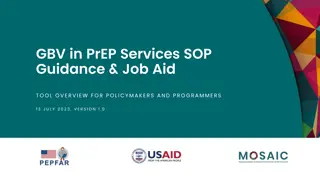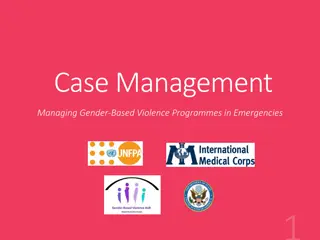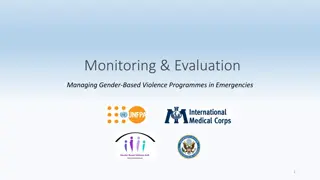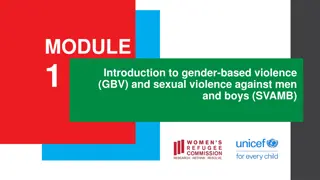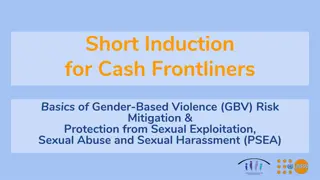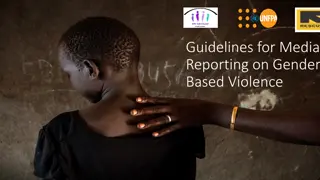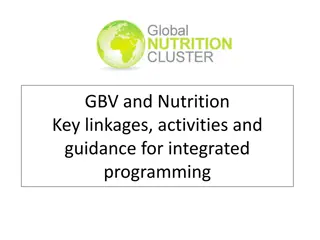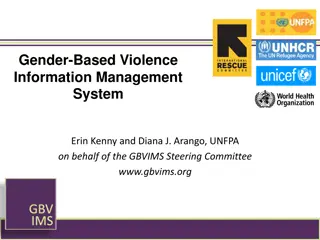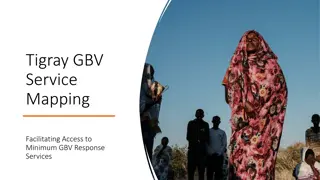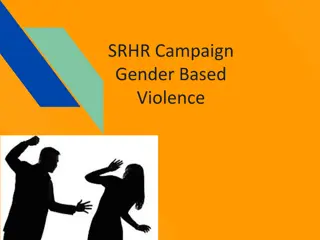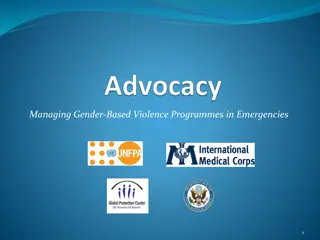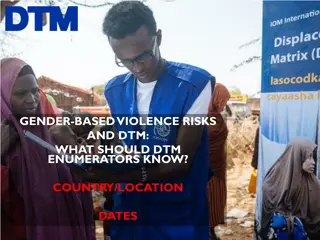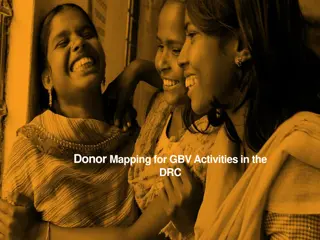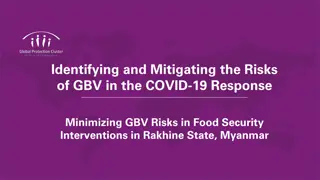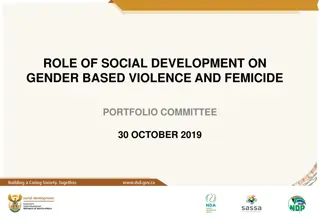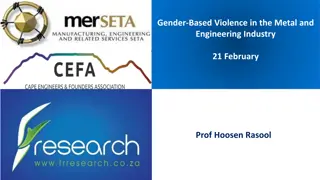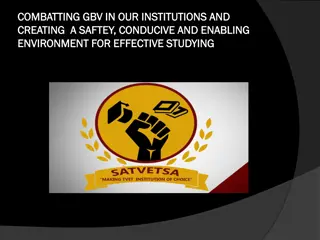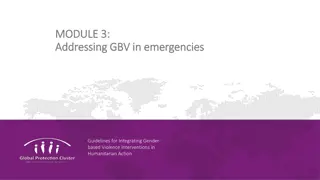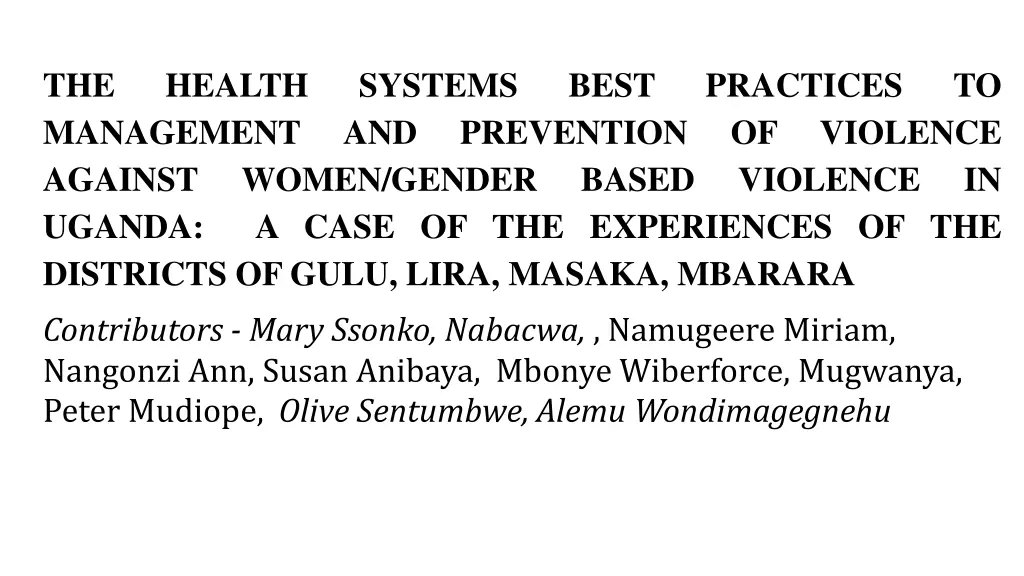
Gender-Based Violence Prevention and Management in Uganda: Experiences from Gulu, Lira, Masaka, Mbarara
Explore the challenges and best practices in preventing gender-based violence in Uganda, focusing on the districts of Gulu, Lira, Masaka, and Mbarara. Learn about the efforts of key health practitioners and opinion leaders to address this critical issue and promote gender equality.
Download Presentation

Please find below an Image/Link to download the presentation.
The content on the website is provided AS IS for your information and personal use only. It may not be sold, licensed, or shared on other websites without obtaining consent from the author. If you encounter any issues during the download, it is possible that the publisher has removed the file from their server.
You are allowed to download the files provided on this website for personal or commercial use, subject to the condition that they are used lawfully. All files are the property of their respective owners.
The content on the website is provided AS IS for your information and personal use only. It may not be sold, licensed, or shared on other websites without obtaining consent from the author.
E N D
Presentation Transcript
THE MANAGEMENT AGAINST UGANDA: A CASE OF THE EXPERIENCES OF THE DISTRICTS OF GULU, LIRA, MASAKA, MBARARA Contributors - Mary Ssonko, Nabacwa, , Namugeere Miriam, Nangonzi Ann, Susan Anibaya, Mbonye Wiberforce, Mugwanya, Peter Mudiope, Olive Sentumbwe, Alemu Wondimagegnehu HEALTH SYSTEMS AND BEST PRACTICES OF VIOLENCE TO PREVENTION VIOLENCE WOMEN/GENDER BASED IN
INTRODUCTION Gender-based violence is public health and human rights problem The patterns and prevalence of violence vary from place to place Worldwide, at least 1 out of 3 has been beaten, coerced into sex, or otherwise abused in her lifetime The consequences : life-long emotional distress, mental health problems, and poor reproductive health etc.
Goal Celebrate the 16 days of activism- 25th November each year- 10th December. The purpose To collect, compile and document information /video from key health practitioners/opinion leaders from selected districts to highlight/show case the on on-going efforts/ promising approaches used to address gender based violence/violence against women in Uganda.
Methodology Based on unpublished documents and data collected from the informants active in the area of gender based violence. A total of 40 respondents were purposively selected in the four districts of Masaka, Lira, Gulu and Mbarara districts. In-depth face to face interviews conducted at their respective departments/agencies.
Respondents included: DHO,DPC, CAO,DCDO), RDC, Magistrate, Health workers, Police in family and child protection unit, Project officer of Mufumi and LC V among others. The findings were thematically manually analyzed
FINDINGS FINDINGS MAGNITUDE OF GENDER BASED VIOLENCE MAGNITUDE OF GENDER BASED VIOLENCE GBV / VAW is still a big problem. varied levels in various districts, urban and rural areas. .low in urban areas Women continue to remain the greatest victims of GBV though it was also reported that some men have also been seen reporting
Masaka 820 persons per year according to DHOs office 1000 according to Mifumi. Mufumi registers 10 women per day. 782 per year (up to October) Mbarara Lira 20-30 persons reported daily at the police Gulu 10 children related cases per day aged 3-17 years
The forms of gender based violence physical (battering) was cited the highest in all the districts visited sexual assaults inform of rape and defilement; family neglect; psychological /emotional /verbal torture economic violence; property related violence was increasing today especially in urban areas.
Factors fueling GBV/VAW Factors fueling GBV/VAW Poverty leading to Denial or failure to provide basic needs to the families . Economic stress due to demands of Economic development was also pointed out in Mbarara and Masaka districts. before the market economy, men used not to get a lot of problem because there was plenty of food, and some foods/fruits were for free. But now due to the hard economic times, some men may go home without a buvera (food) due to failure to earn money especially in urban settings and the surrounding. It becomes difficult to explain that I don t have anything . Therefore to defend themselves, they resort to beating (Respondent Masaka) . breakdown of society closely linked to war and the changing societal economic and social structures Alcohol and drug abuse The Effects of HIV/AIDS i.e stigma and pressures
Consequences of Gender Based Violence Consequences of Gender Based Violence Lack of prosperity in families due to psychological and physical torture on women, men and children less concentration of children in class single-parents Extra-marital affairs are sometimes as a result of violence at home- Increases prevalence of HIV/ AIDS separated men may decide to marry other women, who mistreat their step children Loss of lives
SECTIONAL RESPONSE TO GBV SECTIONAL RESPONSE TO GBV Methods/processes used by the DCDOs for addressing GBV/VAW Referrals made to police for legal aid; hospital for medical help/check-up, Mifumi for shelter Integration and re-integration of survivors Building the capacity of the community Building clubs in the schools To them, not one single approach can be concluded to be good, but networking and building the capacity of community survivor support groups
Methods/processes used by magistrates/courts: Methods/processes used by magistrates/courts: Prosecuting the offenders Legal advise Mediation - the parties are brought together to resolve the issue Sensitize people to stop acts of GBV Best practice/approaches identified by the magistrates Mediation has registered more success than others because it involves the two parties coming together and solving issue at hand.
Methods Methods used by hospitals/health Centre s in the used by hospitals/health Centre s in the management of GBV management of GBV Laboratories helping free of charge Screen victims for HIV- if they are negative, they are introduced to PEP to prevent them from further exposure to HIV. Treating the sick Sensitization through radios The most successful approach has been the PEP
Methods/Processes used by MIFUMI Methods/Processes used by MIFUMI Preventive- change the attitude, mind, and behavior of the people through outreaches, awareness campaigns, talk shows, dialogue shelter Strengthen systems . Psycho-social support community mediations, where perpetrations and the survivors brought together to reconcile. There is no single method that can be pointed out to be better than others, though there is need to strengthen more the preventive measures
The police The police methods/responses methods/responses Community policing: the police -engages sensitize and educate the community members on their rights, Domestic violence Act and where to report in case they experience violence. Effect laws like the Domestic Violence Act Work with other organizations / institutions to help survivors of GBV e.g. Make referrals to hospitals; Mifumi for shelter, legal issues referred to court
Successes registered by health Successes registered by health a reduction in the cases of rape and defilement. victims now seek timely medical services as soon as they become victims of GBV. health workers have been trained in S/GBV which has increased management of survivors thus an achievement. GBV clinic which runs for 24 hours a week so survivor/victims hence improved SGBV service delivery
Successes registered by the police in the visited Successes registered by the police in the visited areas: areas: Families experiencing GBV have reduced Families stabilized Children are able to go to school because of the help rendered through the probation office
Successes registered by DCDOS in the prevention of Successes registered by DCDOS in the prevention of GBV GBV Strengthened networks with other stakeholders like Mifumi, Police, Human rights organizations Increase in reporting GBV cases to supportive systems, which was nonexistent on the past. Reasonable community involvement
Successes Successes registered by registered by Mifumi cases cases Mifumi in handlings GBV in handlings GBV Strengthened a number of structures to take over like LC s trained to handle cases and report Support groups have been established in the communities Men are getting involved / Men groups like boda boda cyclists-three groups have been formed in three different sub-counties. Schools involvement Over 1000 people have been supported through the shelter
Challenges by Challenges by MIFUMI MIFUMI Limited resources Some LCs personnel are uncooperative in handling cases
Challenges faced by the health Centre's Challenges faced by the health Centre's &Hospitals in the management of GBV &Hospitals in the management of GBV lacks of some equipment's and materials for examination. Not all staff members are equipped with skills to conduct the examination. partners might decide to negotiate out of the court, a few cases examined are prosecuted. There is usually lack of transport especially for those who go to court in case of assault, domestic violence.. .
challenges challenges- -Magistrates Magistrates/ Resident District Attorney / Resident District Attorney in preventing GBV in preventing GBV system is a bit slow Transport problems among others backlog of cases Under the law of Domestic Violence and Children s Act, Gender Based Violence systems are laid yet they are non- existence. The Lower Local Councils have completely collapsed especially LC l and ll.
Recommendations by the various Recommendations by the various sections sections Police need to empower more members especially at village level DCDOs: There is need for a sustainability plan for the shelter Health Need for more capacity building especially for health workers Magistrates/courts of law The LC system has to be revamped to do its work. Local Council members should be civil servants.. Continuous sensitization about the ills of Gender Based Violence
Recommendations Mass media should become more responsive

